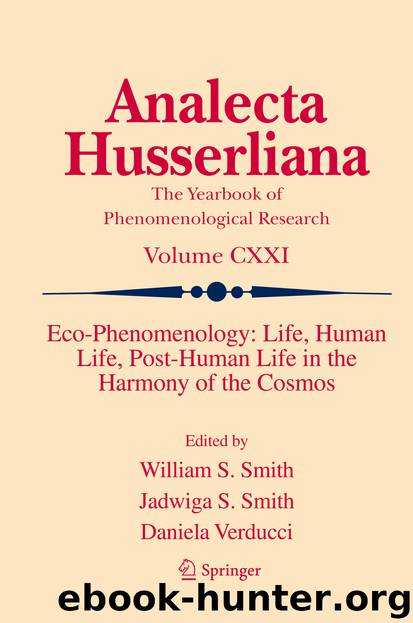Eco-Phenomenology: Life, Human Life, Post-Human Life in the Harmony of the Cosmos by William S. Smith Jadwiga S. Smith & Daniela Verducci

Author:William S. Smith, Jadwiga S. Smith & Daniela Verducci
Language: eng
Format: epub
Publisher: Springer International Publishing, Cham
Okri’s Human Ecology
Okri’s treatment of humankind in both poems discussed in this article is, likewise, rooted in eco-phenomenology. On the brink of a new life together in London, Viscount Ivor Guest and his bride, Ieva (a Latvian beauty), are enjoined to:… Travel
Into one another, as into
A country you have long admired,
And read many fables about,
And now find yourself
Before its famed rivers
Its inspiring mountains. (Stanza 3, ll.20–26)
In contrast, “Lines in Potentis” is addressed to the London populace, possibly the most cosmopolitan in the world, who are enjoined to attune to the “wild,” to the Elizabethan Music of the Spheres; to “Create the beautiful/Music our innermost/Happiness suggests delight the future./Create happy outcomes” (Stanza 4, ll. 46–49). Londoners, Okri implies, are those who have awakened “to their essential true nature as consciousness and recognize that essence in all ‘other,’ all life forms” (Tolle 2005, 309). They feel a oneness with the ecological epistemology of the whole, as Okri suggests in “Lines …:”Tomorrow’s music sleeps
In our fingers, in our awakening
Souls, the blossom of our spirit
The suggestive buds of our hearts. (Stanza 3, ll. 31–34)
Download
This site does not store any files on its server. We only index and link to content provided by other sites. Please contact the content providers to delete copyright contents if any and email us, we'll remove relevant links or contents immediately.
| Anthropology | Archaeology |
| Philosophy | Politics & Government |
| Social Sciences | Sociology |
| Women's Studies |
The remains of the day by Kazuo Ishiguro(8970)
Tools of Titans by Timothy Ferriss(8365)
Giovanni's Room by James Baldwin(7326)
The Black Swan by Nassim Nicholas Taleb(7106)
Inner Engineering: A Yogi's Guide to Joy by Sadhguru(6785)
The Way of Zen by Alan W. Watts(6600)
Asking the Right Questions: A Guide to Critical Thinking by M. Neil Browne & Stuart M. Keeley(5758)
The Power of Now: A Guide to Spiritual Enlightenment by Eckhart Tolle(5750)
The Six Wives Of Henry VIII (WOMEN IN HISTORY) by Fraser Antonia(5496)
Astrophysics for People in a Hurry by Neil DeGrasse Tyson(5182)
Housekeeping by Marilynne Robinson(4436)
12 Rules for Life by Jordan B. Peterson(4299)
Double Down (Diary of a Wimpy Kid Book 11) by Jeff Kinney(4261)
Ikigai by Héctor García & Francesc Miralles(4246)
The Ethical Slut by Janet W. Hardy(4242)
Skin in the Game by Nassim Nicholas Taleb(4237)
The Art of Happiness by The Dalai Lama(4125)
Skin in the Game: Hidden Asymmetries in Daily Life by Nassim Nicholas Taleb(3989)
Walking by Henry David Thoreau(3953)
